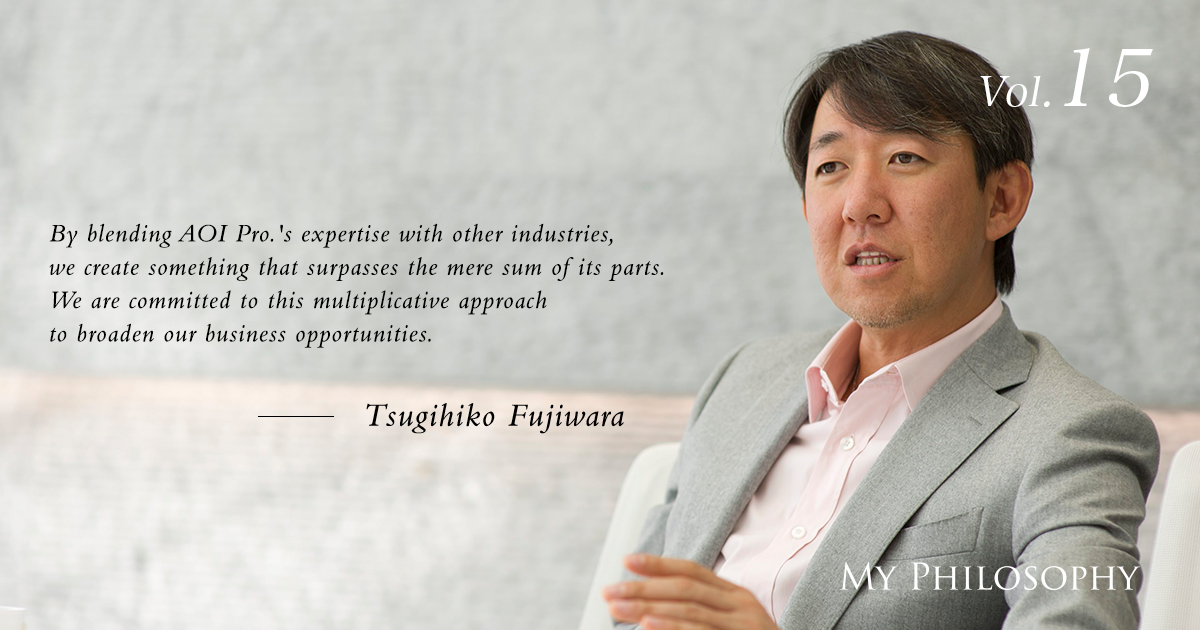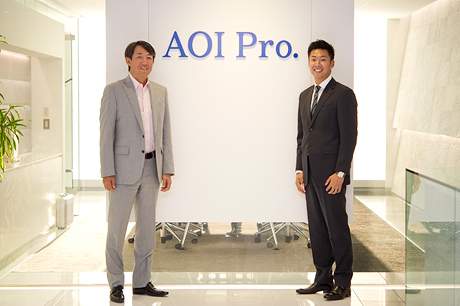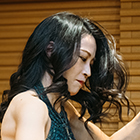
Having made a name for himself as a commercial producer, Mr. Tsugihiko Fujiwara assumed the role of president at the young age of 44. We had the opportunity to hear his views on the roles and skills of a president, as well as his future aspirations in his capacity as president.
Profile
Vol.15 Tsugihiko Fujiwara
President and CEO of AOI Pro. Inc.
After graduating from the Department of Cinema, College of Art at Nihon University, Tsugihiko Fujiwara joined AOI Pro. Inc. He handled numerous high-profile projects as a commercial producer. In 2004, he became a director of the company, and in 2010, at the age of 44, he was appointed as the youngest-ever President and CEO. On July 1, 2012, the company's name was changed from Aoi Promotion Inc. to AOI Pro. Inc. Under his leadership, characterized by flexible thinking and firm convictions, he continues to steer the company forward.
Mr. Tsugihiko Fujiwara, the President, passed away on February 22, 2015, at the age of 49. I have always been deeply impressed by Mr. Fujiwara’s business acumen and have regarded his approach as ideal. There was still so much I wanted to ask him. His departure came too soon, and it is truly regrettable. I sincerely pray for his eternal peace. “My Philosophy” Editor-in-Chief, DK Sugiyama
The Only Thing that can Back Up Confidence is the Track Record You Build Yourself.
When I became president, I believe there were hardly any employees who thought, “Why him?”. Though some might have thought it was too soon (laughs). I had built up a track record convincing enough for those around me. Since the age of 27, as a producer, I received several President’s and Chairman’s awards, and my position steadily advanced. By around the age of 38, I had a firm belief that I would someday become president. When I was appointed as a director, I felt grateful for the company’s courage and I felt proud at the same time. I also realized that the time would inevitably come when I must take the top position. I had to be aware of that. If someone raised to the management team at 38 stays in the same position, it’s nothing but their own lack of effort.

Now, within the company, I wonder if there’s anyone thinking, “I will become the president and lead AOI Pro.” That’s not very clear. Motivation for work should not depend on others’ evaluations but must be built on one’s own achievements. However, within the next decade, high-caliber talents will surely emerge. It’s also a president’s job to quickly identify and nurture these rough diamonds. If the company loses its vitality after I’m gone, it would be problematic, so cultivating the next generation is an urgent task to ensure the company’s longevity.
As long as the employees feel, “We want this person to remain president,” it doesn’t matter how young or old they are, they should remain in the position. Conversely, when employees start thinking, “It’s time for a change,” that’s my cue to step down (laughs). The role of president is not tied to age. “As long as everyone thinks we still need Fujiwara as president, I will continue. But if a superior talent emerges and it’s said that this person would be better, then I will gracefully step down from the presidency (laughs).”
AOI Pro. × Challenges with Other Industries
Currently, we are pursuing new ventures that aim to significantly enhance our company’s scale, exploring opportunities where the sum exceeds the individual parts, such as 1 + 1 surpassing 2. For example, we are considering what might happen if we combine our main business of video production, as part of AOI Pro. Group, with something quite different like agriculture. This fusion of disparate elements could create new business opportunities. Initiating new projects is not easy, and they often do not go as planned.
We’ve started several initiatives over the past three years and faced many challenges, but I believe that’s acceptable for now. In business, persistence and knowing when to exit are crucial, and it’s up to the management to have an instinctive sense for these decisions. Whether to stop and pull out from a loss-making venture or persist with a current deficit in hopes that it blossoms significantly in four to five years, is a judgment call no one else can make. This discernment is the prerogative of the top executive, and that’s the thrill of being a president. Sometimes, when two or three board members say, ‘There’s a risk, let’s not do it,’ that’s exactly when you need to give the go-ahead to progress in business. Projects that everyone agrees on might already be lacking innovation. It’s by doing things that astonish everyone that freshness is maintained and new explosions of innovation are created.
What’s necessary for a president is the spirit to take risks on such possibilities and, in case of failure, the humility to sincerely apologize and say, ‘I’m sorry, I was wrong,’ and quickly make adjustments. People will follow a leader who can do this. In Japan, there is a tendency to resign to take responsibility for failures, but I believe a true leader should rectify their mistakes before stepping down. That’s how a top executive should handle responsibility.
Transforming Fujiwara-ism into AOISM

Since entering the workforce, I have consistently pondered how to communicate smoothly with customers and how to differentiate ourselves from competitors. Over the years, I’ve maintained several practices diligently, such as “speed communication” where I ensure prompt responses to emails and return calls quickly. Those who are slow in this respect are missing out on business opportunities. Another aspect is being the “ultimate yes-man,” never outright rejecting requests but instead offering alternative solutions. These practices have gradually come to be known as “Fujiwara-ism” among my colleagues. I wanted to make this the ethos of our company, and I shared the seven most important aspects during my inaugural speech as president.
Recently, I’ve been thinking about adding another element, which I consider the ultimate tool in communication: the ability to “change the atmosphere.” This isn’t about cracking jokes or lightening the mood, as that can sometimes make things worse. It’s about quickly and accurately understanding the core issues stalling a discussion and then injecting the right words to reignite the conversation. This might have been one of my special skills. Back when I was on-site, I was often told how, upon entering a struggling editing room, it would transform into a place filled with laughter within five minutes.
Key to this skill is the ability to calmly analyze situations and have a wealth of ideas at your disposal. While effort is crucial, some innate sense might also be necessary. To build this reservoir of ideas, one must remain intensely curious about all sorts of things daily. That’s why I make it a point to dine with younger generations and stay abreast of cutting-edge trends. I may not have a specific trade skill, but I aim to be the best communicator. “The man who can change the atmosphere” – that, to me, is the highest accolade for a businessman.

Since launching “My Philosophy,” this interview with Mr. Fujiwara marks the 15th series. When requesting interviews, I pose questions based on the issues currently on my mind and those I sincerely wish to inquire about, seeking insights into management. Through these interviews, I assimilate the philosophies of the featured individuals, interpret them in my own way, and use that understanding to guide my next actions.
Mr. Fujiwara is a man who practices what he preaches. He is well-acquainted with the field and has established “Fujiwara-ism” with principles like “the ultimate yes-man” and “speed communication.” As someone who also values practicality and tangible results, I find these two philosophies to be of utmost importance in conducting business. It is clear that no matter the skill level, without passion and a customer-oriented approach, one will not be chosen. Meeting Mr. Fujiwara strengthened my desire to become a company and a man that continues to be chosen, someone who can change the atmosphere of a place.
Now at 33, I aim to establish my own philosophies, Sugiyama-ism and Interliteracy-ism. Thank you very much to everyone who has always supported me. Please look forward to the explosive growth of Interliteracy.
November 2012, at AOI Pro. Inc. Edited by Naomi Kusuda. Photography by Daiki Ayuzawa






























































































































